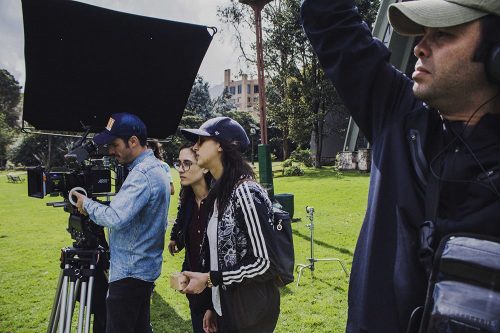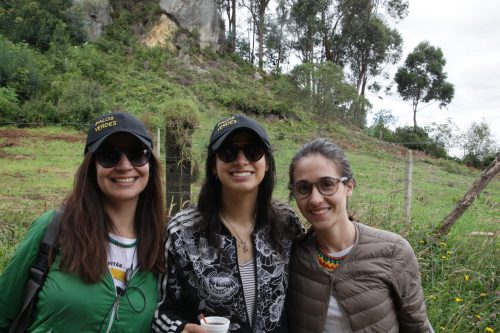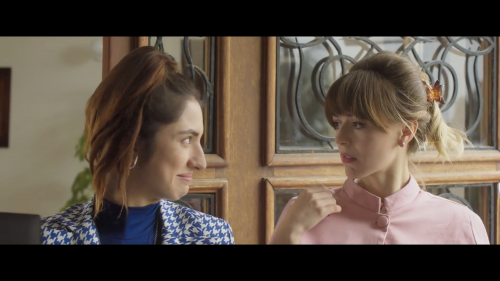This February, Colombia saw the premiere of a film that was the first of its kind. Bendita Rebeldia is the first female-led comedy film produced in Colombia. Centered on a young heiress who moves back home to Colombia after a stint of failed marriages and shady contracts in Mexico, the film provides a perspective on Colombian women and the expectations and roles placed on them by their familial obligations.
I had the opportunity to interview Colombian transplant and USC graduate, Cristina Andrade, about her work as a producer on the film.
Interview edited for brevity and clarity. Partial spoilers ahead!

How did you get into film?
Laura, the director of the film, she also studied at my university and she was also studying something non-film related. Our university didn’t have film as a major, so I was studying law and she was studying economics. And we bonded over wanting to go into film while having traditional degrees. And we always talked about doing a project in the future. I always thought that future was going to be very, very far away. But near the time I got accepted into USC, she told me she had written a script, and she wanted my opinion. I saw that as my chance to produce something so I asked her, ‘Hey, do you have a producer?’ She said, ‘No, I’m looking.’ I was like ‘oh, okay, I would love to, here’s my pitch.’
Always ask, right? The worst they can say is no!

So Laura herself said that she thought of this movie as being unconventional because it was humorous without making the women the butt of the jokes. So, how would you describe female driven Colombian comedy right now? And how do you hope to fit into that space?

That space almost does not exist. There are some amazing female directors and there’s a lot of female producers in Colombia, but I can only think of one other female comedy director. We started noticing, coincidentally, that it was not common for the director and the producer to both be women. Most of the time, it’s one or the other. Also a lot of the times, the different heads of departments are mostly men, depending on the department. In our case, our director was female.
What makes this film unique is that it was directed by a woman, produced by women, and the protagonists are women. So, that was special. The only other movie I can think that was also like that was directed by Ruth Caudeli, starring her girlfriend Sylvia Varón. The movie is a lesbian love story called Eva and Candela. So they were really breaking ground, but it did not have a wide release in Colombia. Ours was the first female driven movie to have a wide release. I guess we’re paving the way.
And different countries have different types of humor. I don’t want to speak ill of other films because, after doing this, I know that you do your best. You really do your best, but it is very common to have a joke about the fat woman. Or the joke about the sexy woman, and the ugly guy. That whole dynamic, we wanted to move away from that. Our main story is about the relationship between a niece and her aunt. That was important to us that it wasn’t around a love story.
And on that note there’s a really important moment towards the end of the movie where Beatriz is trying to decide whether or not she should be with a man, and she ultimately decides not to.
For Laura, the other producer, Sindy Lopez, and I that was an important part of the character’s growth. I don’t know if you got this from the story but when she lived in Mexico, she married twice and they divorced twice. In part because she thought she was gonna solve her problems by finding a man. That didn’t work out. So by showing this ending, we were showing that she didn’t need a man to be complete.
And you mentioned different Latino humor. Do you hope to open the film up to a wider Latino audience?
 My mom is Puerto Rican. My dad is Colombian, I was born in Brazil. Laura is half Panamanian half Colombian, but she has a lot of Dominican family so she’s also very close to Dominican culture, and even the main actress Luna Baxter. Luna is half Colombian, half Argentinian and a little Guatemalan. Laura and I bonded over having that Latino identity.
My mom is Puerto Rican. My dad is Colombian, I was born in Brazil. Laura is half Panamanian half Colombian, but she has a lot of Dominican family so she’s also very close to Dominican culture, and even the main actress Luna Baxter. Luna is half Colombian, half Argentinian and a little Guatemalan. Laura and I bonded over having that Latino identity.
So we really tried not to use overly Colombian language, because we wanted the movie to travel well in the Latin America. We didn’t want the movie to be too Colombian. That’s sort of why you don’t know which war, you don’t know where it was, and we never mentioned the name. I think we never even mentioned the word Bogotá. Like there’s one part where she says like “I am staying in your apartment in the city.” That could be in a lot of big cities in Latin America. We tried to neutralize it.
Tell me more about working with a female lead production team. You mentioned that most of the department heads were women?
So actually that was very easy. I don’t know if I could do a movie with men, honestly. Even though we had a lot of male allies, including the cinematographer. He’s a male, he’s great. I think it’s more common for women to have female friends and men to have male friends. The reason this ended up being a female lead film is because…
That’s who you knew.
Yeah! That’s who you know and in most movies, the way you choose the crew and the cast is through who do you know and who is your friend. And that’s the whole point why you need more women behind the camera. They’re gonna look for their friends to put them in the movie, and traditionally men will put their friends in who tend to also be men.
So on the note of feminism in Colombia, is it true that women are not really allowed to serve as combatant fighters in the army right now?
There are a lot of high ranking officers who are women. I always saw that as one of the great advantages for being a woman not having to serve in the military because men have to serve. There has been a whole issue around trans-women asking to serve since they were born, quote unquote, as men. I’m not sure if the court has made any decision yet.
But that makes Elvira’s choice to leave the nunnery to be a fighter extra exciting.
Yeah and strange also because, as you can tell from the house where they grew up she’s an upper class lady. Something that happens in almost every civil war is that the people who are fighting the front lines are not necessarily the children of the powerful and the rich. We do not say that explicitly because it’s still a very sensitive topic. But we, especially Laura, wanted to touch on the unfairness of the class division in the Civil War.

You also don’t mention explicitly, but are we supposed to take away that she joined the People’s Army? FARC?
Yes. I think that Laura wanted to show with this story that Elvira learned that that was not the answer. The answer was education. She has this lover who wants to get her killed, like, not a good move.
And so after that it’s like, ‘okay, I should open a school because what I want to achieve is equality, which is achieved through education, not through fighting.’
But Laura also wrote the script in the midst of the peace process. Part of the peace process is forgiving the other side and understanding that the other side is also made up of humans. That was why she wanted Elvira to come join that movement.
What should audiences make of Beatriz’ divorces?
By having the main character twice divorced, you never know with her if she’s a bad or a good person. You might feel sorry for her because she’s so naive. So we wanted to get her out of that duality of Saint or Whore, which is what you see in a lot of telenovelas, she’s either evil or good.
We wanted her to be more like a human person. I mean, women are human too. She was an imperfect character and her aunt is very imperfect too, she’s the same. They’re neither good nor bad. We wanted to stick to that. In the US, lately there’s been a lot of female characters that are more complex, but that also happened here in a lot of shows.

So, going back to the duality, I brought up the scene at the top of the movie when she assures her plane-mate that ‘it’s just tobacco’. Marijuana plays a big role in the film, and knowing the context of marijuana, especially in Mexico since that’s where she’s coming from, is there anything that we should be taking away from her continued use of this?
I think the marijuana use in that scene specifically just shows how Beatriz is really bad with boundaries. She doesn’t understand boundaries and she’s back at the school as a teacher, but she herself is mentally a teenager. By the end of the film she’s behaving like an adult, but in the beginning, she doesn’t see herself as older than the students. It’s probably happened in every generation, but that’s the classic millennial stereotype. I think that the marijuana is just to show how she’s confused about who she is, what a person her age should be, how to behave as an adult, as a woman and not a girl.

As a queer woman, watching this film, there was some part of me that kind of wanted to assign queerness to the assistant to the headmistress. She also doesn’t acknowledge boundaries, and she gives her a little… look. What would you think about someone taking that away from the film?
I’m so happy that you took that away. In the ideal movie since we were trying to break ground, I would have loved for to have more queer characters. Actually, I don’t know if you noticed, at the end of the party when there’s two dads.
Colombia’s backwards in some things, but it’s not in others. Like, gay marriage is legal, which is crazy for a country that is so conservative.
I’m really glad that that’s what you took. The PE teacher, that’s Syliva Varon, the actress from the film I mentioned earlier. But Sylvia in this movie does not have a female partner. She’s just a PE teacher. So we try, little by little. It’s fun.

Okay, so the film opened in March. How’s it going? What’s going next? You went to South Africa for a festival.
Yeah, so the film lasted a full week, which is very good for an independent movie. We were actually only a week because I think our distributor needed more theaters for the Oscar nominees. So we did very well in the three big cities in Colombia, we did not do well at all with the smaller ones. That was part of the risk, but a lot of the marketing was done around ‘first female lead comedy’. Looking back, that’s maybe not a good selling point in a lot of parts of Colombia, because it is so conservative.
The comments were super weird once people saw the headline ‘female lead’. One woman said “Just because it was made by women doesn’t mean it’s better.” And I really wanted to answer it. But other people [in the comments] just said, “hey, they never claimed that, it’s just a statement of fact.” She asks, “but why is that important?” That happens everywhere in the world with feminism. Feminism is still unfortunately a dirty word to some people.
What was nice to hear was that there were a lot of showings where people clapped at the end. That’s really sweet. And we also had very good reviews. Ideally we would like to end up on a streaming platform, so fingers crossed.




